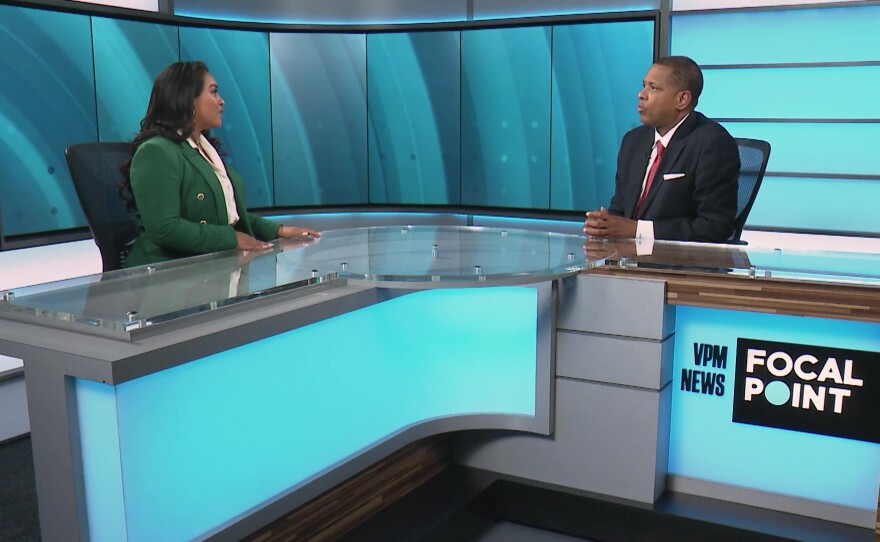TRANSCRIPT OF VIDEO
KEYRIS MANZANARES: Many people across the Commonwealth live in places that are subsidized by government funding. Recently, Virginia Governor Glenn Youngkin announced $52 million in loans for affordable housing projects across the state of which Richmond will receive $13 million. Joining us to talk about how that money will be spent is Steven Nesmith, CEO of Richmond Redevelopment and Housing Authority. Thank you for joining us.
STEVEN NESMITH: Thank you for having me. I'm happy to be here.
KEYRIS MANZANARES: Will you tell us a little bit about the role that RRHA plays in the Richmond community?
STEVEN NESMITH: First of all, we are the largest public housing authority in the Commonwealth of Virginia, located in Richmond, We serve about 4,000 families in the city of Richmond and we're also the largest landowner and redevelopment authority as well.
KEYRIS MANZANARES: How is RRHA planning to use that $13 million that it will be receiving in state and federal funding?
STEVEN NESMITH: We have the oldest infrastructure from Miami all the way up to New Hampshire and so one of the ways which we will use some of that funding is to rehabilitate our old infrastructure.
KEYRIS MANZANARES: Where has Richmond been falling short when it comes to meeting public housing needs?
STEVEN NESMITH: I think that where we've fallen short is trying to find affordable housing. There is a shortage of affordable housing across the country, and Richmond is no different in that area. And so, what we are trying to do, the Richmond Redevelopment Housing Authority, is to focus on the supply side of affordable housing.
KEYRIS MANZANARES: You've proposed mixed use spaces to replace Richmond's existing public housing. How do you respond to concerns that there won't be enough affordable housing options to meet the current needs?
STEVEN NESMITH: So, what you've seen is, post a pandemic, a lot of commercial property owners have said, "You know, what we're going to do is make our commercial buildings available for those investors who want to come in, acquire those commercial buildings, and retrofit them for residential." And that's how we deal with the issue with the lack of supply on the residential side.
KEYRIS MANZANARES: You have an initiative called the Come Home Ownership that you're hoping to roll out this year. Could you tell us how that initiative is different?
STEVEN NESMITH: If you look at most public housing authorities in the Commonwealth of Virginia, and across the country for that matter, most of their home ownership programs is linked to what's called a voucher program. So, what we're going to do and how our home ownership program is different, we will, we're the first in the nation that's going to expand home ownership opportunities for public housing residents for all public housing residents. And what we believe is that we're going to give public housing and residents not to look at their credit score, but rather to identify public housing residents who have demonstrated two years or more to be able to pay their rent on time month-after-month, year-after-year. Rather than look at their credit score solely, let's look at qualifying public housing rents based on their demonstrated ability to pay their rent month-after-month, year-after-year.
KEYRIS MANZANARES: This week you've made an announcement relating to a program that you're rolling out called Hopes, Jobs and Security. Can you tell us more about that initiative and how is it different from previous efforts to provide programming and training for residents?
STEVEN NESMITH: It's different because most housing authorities when they see there is crime, they'll come in with a security force. What we are saying is we're invested in doing early intervention and investment in the residents. We've identified public-private partnerships that are going to go in and provide free job training. And at the end of that training, specific job opportunities. We are bringing in a group that's going to do conflict resolution and de-escalation training for public housing residents and young people who might want to grab for a gun or a weapon, to say "Let's deescalate and try to work on our problems." We don't want our public housing residents to even come in contact with security officers or nor the police. We want to do early investment so they can find a place of hope and opportunity to succeed to a place of self-sufficiency. And so that's the goal.
KEYRIS MANZANARES: What will that look like for residents who want to access what you're going to be providing?
STEVEN NESMITH: Our job training and also the job opportunities and the wellness programs will be all at our six public housing sites and our six senior sites. On the wellness and healthcare side, we have six healthcare resource centers that we call them, or clinics, where our residents can come and get some of that training for wellness, mental health, that's an issue, and healthcare disparities. So all of the opportunities will be held on the sites within the public housing and senior communities.
KEYRIS MANZANARES: I read that you, you know, grew up in public housing and now, you know, you're the CEO of Richmond Public Housing. How has that experience kind of shaped what you want public housing to look like in the future?
STEVEN NESMITH: I did grow up in public housing. I'd like to say that I also grew up on welfare. And I'm proud of those two facts because but for those two facts and having to go through the trials and tribulations in my life, it has given me the sensitivity how I approach solving the problem, difficult problems at RRHA in public housing. The way I'm looking at it differently is that I want to provide an opportunity and pathways for our public housing residents in Richmond to get to a place of self-sufficiency. And we're providing the tools for our residents to get to that place rather than say, generation after generation, "I'm going to be living in public housing." That was never what public housing was intended to do. It was intended to be transitional housing.
KEYRIS MANZANARES: As CEO of RRHA, how do you define success?
STEVEN NESMITH: It's about how we define success and how we at RRHA defines success by how are we, can we, can quantify how many people are we moving them to the American dream? What's that? A place to self-sufficiency. We're in the business of transforming lives and when we can quantify that, that we are getting people to a place of self-sufficiency, that is how we're measuring success. We also measure success, our ability to bring in another family into that safety net that's been on the waiting list. That's success because now you're making movement. You're graduating people as a self-success and you're providing pathways for others who are on the waiting list to come into that safety net as well. That's what success looks like. Changing the lives in a transformational way. That's what success looks like.











